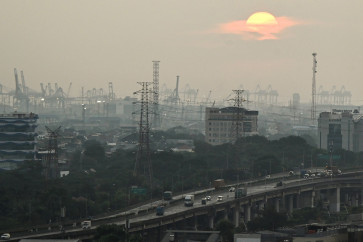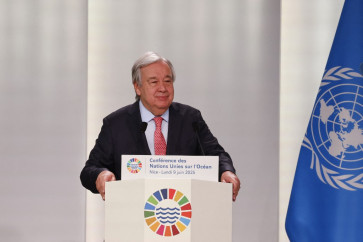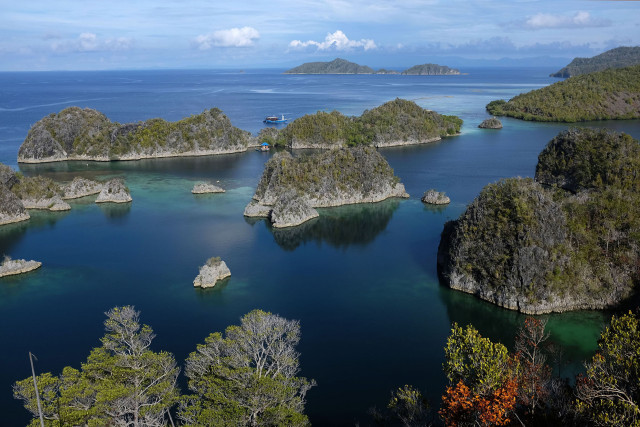Deutsche Bank keen on RI consumer finance
The banker discussed the state of Indonesia’s economy amid geopolitical turmoil and possible recession in Europe with The Jakarta Post's Mark Lempp and Fadhil Haidar Sulaeman, on Sept. 8.
Change text size
Gift Premium Articles
to Anyone

A
lexander von zur Muehlen, CEO of Deutsche Bank for Asia Pacific and member of the management board, recently traveled to Indonesia where he met with business associates, government representatives and employees. The banker discussed the state of Indonesia’s economy amid geopolitical turmoil and possible recession in Europe with The Jakarta Post's Mark Lempp and Fadhil Haidar Sulaeman on Sept. 8.
Question: With high energy prices due to sanctions and a suboptimal Chinese economic performance, how would you describe the state of the global economy?
Answer: In the near term, we are in a recessionary environment in the United States, with Europe being expected to follow.
You have a very determined Fed in terms of fighting inflation, and consequently we are probably going to see many rate hikes coming in the foreseeable future.
Given the de facto dollarization, by and large, there will be a significant effect in this regard as well, and many central banks in this part of the world will not follow on a one-for-one basis, but broadly speaking, will follow the Fed.
Europe will also need to fight inflation, and given its energy dependency on Russia, the immediate price effects are more severe than anywhere else in the world. Consequently, the ECB will also be subject to rate hikes, but we should expect an increasing rate differential between the euro and the rest of the world, as the ECB will try to simultaneously balance the impact on high debt-burdened nations in Southern Europe.
The export industry in Europe is going to get more attractive due to the windfall gain from the weak euro, but on the offset you have increasing costs and imported inflation due to the lower currency and the move to alternative-energy sources.
How do the conditions in Europe affect ASEAN, and Indonesia in particular?
Undoubtedly, there are dependencies, as the stock of inventories [in Asia] acts as a supply-side for the US and Europe. The reduction of activities is already happening.
Indonesia, given its access to resources and energy, is not facing the same pressure points, and when talking about inflation, it is quite contained. So, in a way, the economy here is a lot more shielded against those specific effects.
The next couple of months and quarters are certainly going to be affected by what's going to happen in Europe and the US, but we are very constructive on the economic development in Indonesia.
How big a threat are higher energy costs to Germany’s competitiveness against emerging Asian economies?
Steps are being taken to find substitutions, to find a bridge mechanism. LNG terminals are being built.
The energy mix in large parts of Europe needs to be modified very quickly, and at least in the short run it will not work with renewables only, because they come with seasonality effects and dependencies.
If you are an energy-intensive producer of goods, going forward you may want to move more production capabilities closer to the source of energy. Consequently, we might also see production activities move elsewhere.
Do you think that European countries should invest in Indonesian coal mining to produce more coal, even though this goes against the green transition?
The speed and direction of the green-transition proposition is currently impacted by the fact that the "traditional sources" of energy are disrupted or come at a very different price point than they used to.
In Germany, the move toward renewable energy is accelerating, but there's only so much capacity you can build, and then we need to manage the seasonal swings.
Consequently, we need to make sure we have a better portfolio of alternatives, but there will not be a reemergence of coal, per se; but there is demand, at this point in time, under current circumstances.
The green-transition timeline is getting modified. We're seeing some countries returning to nuclear power, for instance, which is a long debate in itself.
Having only one energy source, particularly one supplier for one energy source, is not how private organizations would generally manage risk, and economies also need to diversify.
How do you see Deutsche Bank's development in Indonesia?
Deutsche Bank was founded to support trade around the globe.
Global trade is not going away. I'm still a believer in globalization, although it comes within a different framework. But there is still a need for economic growth, and it needs to be supported by inbound and outbound flows of capital markets.
For that, we have cross-border capabilities, including skill sets to master the regulatory requirements within different countries, including 15 different markets in Asia Pacific.
Indonesia, with its strong growth trajectory and fundamentals, is a great opportunity for international investors and will continue to see an influx of global capital. We provide that bridge for capital markets, currencies and project financing.
Do you see further opportunities in Indonesian consumer finance?
We definitely think there are opportunities, as it includes the element that supports our sustainability agenda. We do want to make financial resources accessible to more clients, and hence our transactions with home credit in Southeast Asia support financial inclusion.
While consumer finance requires different footprint and platforms compared to ours, we do very much support financial institutions in the region, and that includes insurance and consumer-finance companies.
All of them need access to capital, so they need access to countries other than Indonesia; and at some point, they also will look for investment opportunities outside of Indonesia.
This cross-border element is where we come in, as our focus is not on domestic retail banking capabilities or local consumer financing.
We're also working with some of the increasing number of tech organizations in this part of the world, many of which are going to be the interface of financial products for individuals.









